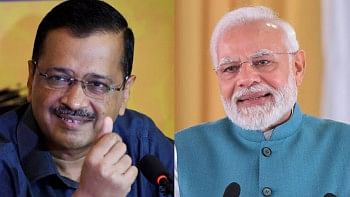A bittersweet Durga Puja

Dhaka city seems to have experienced a juxtaposition of tradition and trepidation during this year's Durga Puja celebrations.
The joyous return of Mahadevi Durga, the goddess of shakti (power), to her maternal home in Martya is a time of celebrations and unity. However, a feeling of unease permeated the festival -- an aftereffect of the distressing incidents that happened targeting the minority communities.
Durga Puja, the largest festival of Bangalee Hindus, has always been more than just a religious observance. It is a vibrant celebration that transcends sectarian boundaries, uniting Hindus and Muslims in a shared cultural heritage. The festival's roots lie deep in Hindu spirituality, celebrating the triumph of good over evil. But beyond its religious significance, it fosters social harmony, encouraging communities to unite in joyful reverence.
In the capital, the festival itself was a spectacle of grandeur. Hundreds of mandaps were erected across the city, adorned with intricate decorations and colourful lights. Devotees offered prayers, sang hymns, and participated in various rituals at Dhakeshwari temple, Siddheswari Kali Mandir, Shankhari Bazar puja mandaps, and Ramna Kali Mandir, among others.
But the shadows of recent communal disturbances loomed large. Reports of idol vandalism and threats against minority communities cast a dark cloud over the festivities. From Molotov cocktails thrown inside a mandap in Old Dhaka to the singing of a song calling for Islamic revolution at a mandap in Chattogram, this year's celebrations highlighted a critical need for understanding and acceptance of a festival that has been a cornerstone of Bangalee culture for hundreds of years.
Mrinmoyee Mitra, a devotee at Ramna Kali Mandir, shared her apprehension. "The security measures that have been taken are commendable, but I don't feel safe or included anymore.
"Our identity and existence have long been under threat. We are celebrating the puja nonetheless, but will we be safe for the rest of the year?"
Another devotee, speaking anonymously, shared a similar sentiment. "My hometown is not Dhaka. My house was attacked, and I received threats after the fall of the Awami League government. Since then, I have been taking refuge at relatives'. I do not want to comment further on this, as I know there is no solution to this problem."
Amid it all, the rituals of Durga Puja pressed on. The goddess was bathed, adorned, and worshipped with great devotion. The city buzzed with life, the chants and beats of drums filling the air.
Ujjal Biswas Guru, the maestro who crafted the grand idols for Dhakeshwari National Temple, said, "Creating the idols of Durga Maa demands a unique blend of immersion and reverence.
"While I go about this process with the same solemn dedication as always, I must admit there was an underlying anxiety this year due to the current political climate."
Durga is not only a nurturing mother but also a fierce protector. Her mythic battles against injustice and evil serve as timeless reminders of her strength and resilience. In this tumultuous time, when Hindu and other minority communities face adversities, Durga stands as a beacon of hope.
Kajal Debnath, a member of Bangladesh Hindu-Bouddha-Christian Oikya Parishad, lamented the recurring violence against Hindu communities. But he emphasised that the number of troublemakers was far smaller than those who had supported and celebrated alongside the Hindus.
Jayanta Kumar Dev, president of the Mohanagar Sarbojanin Puja Committee, pointed to a recent incident in Puran Dhaka where a Hindu temple was targeted but was protected by the local residents and the army.
Despite the challenges, Dev said, he remains hopeful about the future. "Bangladesh has a rich history as a non-communal nation where people of all backgrounds come together to celebrate Durga Puja.
"These celebrations are more cultural than religious, and we are confident they will continue to thrive."
In a display of solidarity, notable figures including Chief Adviser Professor Muhammad Yunus and Chief of Army Staff General Waker-Uz-Zaman had visited Dhakeshwari National Temple, reinforcing their support for the temple and the Hindu community.
As the Durga Puja festival comes to a close, the Hindus reaffirm their commitment to a non-sectarian society and aspire to a future where their traditions are celebrated as an integral part of the national identity.


 For all latest news, follow The Daily Star's Google News channel.
For all latest news, follow The Daily Star's Google News channel. 



Comments